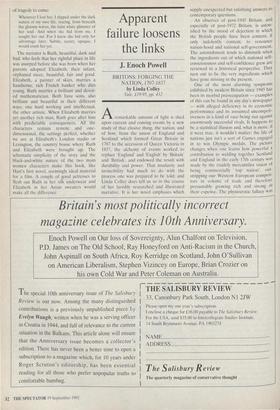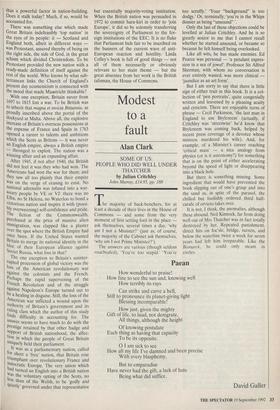Apparent failure loosens the links
J. Enoch Powell
BRITONS: FORGING THE NATION, 1707-1837 by Linda Colley Yale, £19.95, pp. 432 Aremarkable amount of light is shed upon current and coming events by a new study of that elusive thing, the nation, and of how, from the union of England and Scotland which formed Great Britain in 1707 to the accession of Queen Victoria in 1837, the alchemy of events worked to replace 'England' and 'English' by 'Britain' and 'British', and endowed the result with durability and power. That insularity and invincibility had much to do with the process one was prepared to he told; and Linda Colley does tell us so in the course of her lavishly researched and illustrated narrative. It is her novel emphases which
supply unexpected but satisfying answers to contemporary questions. An observer of post-1945 Britain, and especially of post-1972 Britain, is aston- ished by the mood of dejection in which the British people have been content, if only indolently content, to renounce nation-hood and national self-government. The astonishment tends to diminish when the ingredients out of which national self- consciousness and self-confidence grew are reviewed in a historical perspective. They turn out to be the very ingredients which have gone missing in the present.
One of the most alarming symptoms exhibited by modern Britain since 1945 has been its morbid preoccupation — examples of this can be found in any day's newspaper — with alleged deficiency in its economic performance and its asssumed uncompeti- tiveness in a kind of race being run against enormously successful rivals. It happens to be a statistical illusion and, what is more, if it were true, it wouldn't matter: the life of nations just isn't a sort of Games engaged in to win Olympic medals. The picture changes when one learns how powerful a contribution to welding together Scotland and England in the early 17th century was made by the crudely mercantilist vision of being commercially 'top nation', out- stripping our Western European competi- tors in volume of trade and therefore presumably growing rich and strong at their expense. The physiocratic fallacy was
thus a powerful factor in nation-building. Does it stalk today? Much, if so, would be accounted for.
There was something else which made Great Britain indefeasibly `top nation' in the eyes of its people: it — Scotland and England both, albeit in different ways was Protestant, assured thereby of being on the right side, the side of God, in the great schism which divided Christendom. To be Protestant provided the new nation with a ready-made definition of itself against the rest of the world. Who knows by what sub- terranean links the Church of England's present day ecumenicism is connected with the mood that made Maastricht thinkable?
With one exception, Britain never from 1697 to 1815 lost a war. To be British was to inherit that magna et invicta Britannia, as proudly inscribed above the portal of the dockyard at Malta. Above all, the explosive increase of Britain's overseas possessions at the expense of France and Spain in 1763 opened a career to talents and ambitions which the Scots as Britons — it was never an English empire, always a British empire — thronged to exploit. The nation was a winning affair and an expanding affair.
After 1945, if not after 1940, the British did not feel it was they who had won. The Americans had won the war for them; and they saw all too plainly that their empire was on the verge of ceasing to exist. No national adrenalin was infused into a war- weary people by VE or VJ: there was no Elba, no St Helena, no Waterloo to bond a victorious nation and inspire it with (possi- bly overweening) self-confidence and pride. The fiction of the Commonwealth, purchased at the price of massive alien Immigration, was clapped like a plaster over the spot where the British Empire had once been. If the United States wanted Britain to merge its national identity in the bloc of their European alliance against Soviet Russia, what loss in that? The one exception to Britain's uninter- rupted procession of global victory was the loss of the American revolutionary war against the colonists and the French. Perhaps the rapid supervening of the French Revolution and of the struggle against Napoleon's Europe turned out to be a healing in disguise. Still, the loss of the American war inflicted a wound upon the authority of Britain's government and its ruling class which the author of this study finds difficulty in accounting for. The answer seems to have much to do with the prestige retained by that other badge and support of British nationhood, the affec- tion in which the people of Great Britain uniquely held their parliament. It was as a parliamentary nation, called for short a 'free' nation, that Britain rose triumphant over revolutionary France and autocratic Europe. The very union which had turned an English into a British nation !vas the voluntary opting of the Scots, no less than of the Welsh, to be 'godly and quietly' governed under that representative
but essentially majority-voting institution. When the British nation was persuaded in 1972 to commit hara-kiri in order to 'join Europe', it did so by solemnly transferring the sovereignty of Parliament to the for- eign institutions of the EEC. It is no fluke that Parliament bids fair to be inscribed on the banners of the current wave of anti- European reaction and hostility. Linda Colley's book is full of good things — not all of them necessarily or obviously relevant to her main theme — but the great absentee from her work is the British talisman, the House of Commons.



























































 Previous page
Previous page